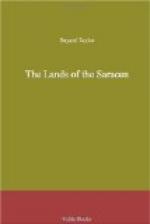Cultivation soon ceased, however, and we entered on a dehesa, a boundless plain of waste land, covered with thickets of palmettos. Flocks of goats and sheep, guarded by shepherds in brown cloaks, wandered here and there, and except their huts and an isolated house, with its group of palm-trees, there was no sign of habitation. The road was a deep, red sand, and our mules toiled along slowly and painfully, urged by the incessant cries of the mayoral, or conductor, and his mozo. As the mayoral’s whip could only reach the second span, the business of the latter was to jump down every ten minutes, run ahead and belabor the flanks of the foremost mules, uttering at the same time a series of sharp howls, which seemed to strike the poor beasts with quite as much severity as his whip. I defy even a Spanish ear to distinguish the import of these cries, and the great wonder was how they could all come out of one small throat. When it came to a hard pull, they cracked and exploded like volleys of musketry, and flew like hail-stones about the ears of the machos (he-mules). The postillion, having only the care of the foremost span, is a silent man, but he has contracted a habit of sleeping in the saddle, which I mention for the benefit of timid travellers, as it adds to the interest of a journey by night.
The clouds which had been gathering all day, now settled down upon the plain, and night came on with a dull rain. At eight o’clock we reached the City of Ecija, where we had two hours’ halt and supper. It was so dark and rainy that I saw nothing, not even the classic Xenil, the river of Granada, which flows through the city on its way to the Guadalquivir, The night wore slowly away, and while the mozo drowsed on his post, I caught snatches of sleep between his cries. As the landscape began to grow distinct in the gray, cloudy dawn, we saw before us Cordova, with the dark range of the Sierra Morena rising behind it. This city, once the glory of Moorish Spain, the capital of the great Abd-er-Rahman, containing, when in its prime, a million of inhabitants, is now a melancholy wreck. It has not a shadow of the art, science, and taste which then distinguished it, and the only interest it now possesses is from these associations, and the despoiled remnant of its renowned Mosque.
We crossed the Guadalquivir on a fine bridge built on Roman foundations, and drove slowly down the one long, rough, crooked street. The diligence stops for an hour, to allow passengers to breakfast, but my first thought was for the Cathedral-mosque, la Mezquita, as it is still called. “It is closed,” said the ragged crowd that congregated about us; “you cannot get in until eight o’clock.” But I remembered that a silver key will open anything in Spain, and taking a mozo as a guide we hurried off as fast as the rough pavements would permit. We had to retrace the whole length of the city, but on reaching the Cathedral, found it open. The




